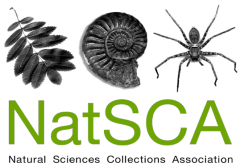Conservation Working Group
Join Our New Conservation Working Group!
We are seeking six dedicated members of the conservation profession to relaunch the NatSCA Conservation Working Group. One membership position will be held for a student or emerging conservator. If you have experience, passion, or interest in this natural history conservation, we encourage you to submit an expression of interest. This group will work collaboratively to share knowledge, develop good working practices, and support innovation in the care and conservation of natural history collections.
If you are interested in contributing your skills and insights, please submit an Expression of Interest by 13th July 2025.
Download an expression of interest form here and email to conservation@natsca.org
Scope
The NatSCA Conservation Working Group is convened as an agile group to support the professional development of conservation professionals working with natural sciences collections. The wide-ranging nature of the materials found in these collections presents unique opportunities for research and exploration into interventive treatments, storage and display, access, advocacy, and past collecting practices. Members to the working group can include conservators working in museums, universities, private practice, researchers, and students.
The group will also seek to raise the profile of natural sciences conservation with respect to other conservation groups, cultural heritage professionals, university educational programmes, and other conservation bodies, such as AIC (American Institute for Conservation), CCI (Canadian Conservation Institute), ICCROM (International Centre for the Study of the Preservation and Restoration of Cultural Property), ICON (The Institute of Conservation) and IIC (International Institute for Conservation of Historic and Artistic Works).
The group is convened to consider, agree, and action guidance and practice in relation to the conservation of natural sciences collections. The group will endeavour to promote the continued professional development of conservation professionals working with natural sciences collections by organising events, conferences, and workshops thereby providing unique opportunities for collaboration and networking. Through this work, natural sciences conservators will be supported by considering statutory and regulatory requirements, best practice, wider ethical frameworks, access, and potential users.
Membership
The working group will have approximately 6x members:
● Chair (convenor)
● Deputy chair
● Emerging or student representative
● 4 x general members
The Chair will typically be the person serving as Conservation Representative on NatSCA Committee. In the absence of a Conservation Represent being elected to NatSCA committee, the NatSCA Committee will nominate a trustee or trustees to act as points of contact between the Committee and the Conservation Working Group, via the Chair and Co-Chair.
It is proposed that the membership term lengths are for two years, with the opportunity to re-apply for the post at the end of the term length. All posts will be selected through an application process where candidates submit their expressions of interest to the NatSCA Committee.
Meeting frequency and format
Quarterly for 60 minutes. To continue for as long as there is sufficient business to merit meeting. The group may continue longer to be convened on an ad hoc basis as and when required for future issues arising.
The meetings are to assign leads, review actions, and to plan for future events. The body of work and consultation will take place outside of the meeting with outcomes and queries reported at the meeting. The main body of discussion at each meeting should centre on those issues that require cross group input to arrive at a consensus or decision. The aim is to keep this agile and within the allocated time.
Record Management
Details of plans and work under consideration are held in the NatSCA Conservation Working Group Google docs files. These are accessible to all members of the working group as well as the NatSCA committee members.
